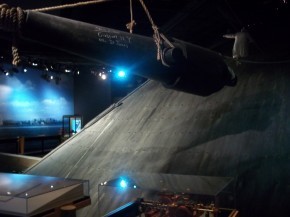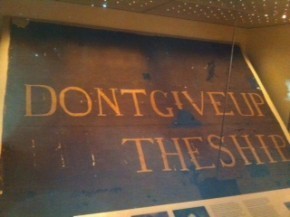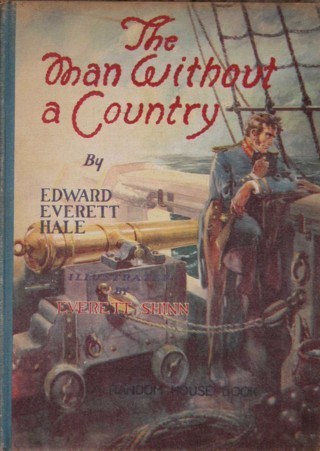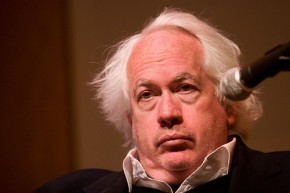Jamie Malanowski's Blog, page 12
July 16, 2013
SOUTHERN SOJOURN: HAMPTON VA, JULY 11
 Went for a pleasant three hour cruise around Hampton Roads. The tour info was a little lighter than I had hoped, but on the bright side, it was nice to spend a cool and breezy three hours on the water (when it was hot and stiflingly humid on lsnd.) We saw many US warships tied up at Norfolk (below), a German U-boat, where the Monitor fought the Virginia, old dilapidated Fort Wool (a dump), and what appeared to be a well-kept Fortress Monroe (above).
Went for a pleasant three hour cruise around Hampton Roads. The tour info was a little lighter than I had hoped, but on the bright side, it was nice to spend a cool and breezy three hours on the water (when it was hot and stiflingly humid on lsnd.) We saw many US warships tied up at Norfolk (below), a German U-boat, where the Monitor fought the Virginia, old dilapidated Fort Wool (a dump), and what appeared to be a well-kept Fortress Monroe (above).

SOUTHERN SOJOURN: NEWPORT NEWS, JULY 10
 The Maritime Museum at Newport News is just splendid. The museum has a lot of terrific artifacts, including the pricelss eafle figurehead from the USS Lancaster, and a whole exhibit on Nelson and his battles at Copenhagen, the Nile and Trafalgar. The highlight is the the terrific exhibit on the Monitor and the Virginia, including an excellent, detailed, informative, film, full size replicas of both ships, and amazingly, recovered pieces of the Monitor, including its turret, which is being restored. The visualizations were wonderful. I could have spent a lot more time there. Don’t miss it!
The Maritime Museum at Newport News is just splendid. The museum has a lot of terrific artifacts, including the pricelss eafle figurehead from the USS Lancaster, and a whole exhibit on Nelson and his battles at Copenhagen, the Nile and Trafalgar. The highlight is the the terrific exhibit on the Monitor and the Virginia, including an excellent, detailed, informative, film, full size replicas of both ships, and amazingly, recovered pieces of the Monitor, including its turret, which is being restored. The visualizations were wonderful. I could have spent a lot more time there. Don’t miss it!

July 15, 2013
SOUTHERN SOJOURN: ANNAPOLIS, JULY 9

Spent the day at the Naval Academy, viewing the library’s special collection of material relating to the Civil War hero William B. Cushing. I visited Cushing’s grave, above, and the Academy museum at Preble Hall. Highlights included the original `Don’t Give Up the Ship’ flag flown by Oliver Hazard Perry aboard the USS Niagara in 1813, quoting the dying command of James Lawrence of the USS Chesapeake in its battle with HMS Shannon, commanded by Philip Broke; and an exquisite model of Nelson‘s HMS Victory, made entirely of bone.

July 8, 2013
A NEARLY PERFECT DAY
 Molly took me to the ballgame yesterday. It was a very hot Sunday afternoon, and we had excellent seats, in the shade the whole game. The Yanks played well, with Hiroki Kuroda pitching seven scoreless innings. We did not hit much, but we did manage to nudge across one little run. As the game went on, we thought that might be enough, especially with Mariano Rivera coming in. But shockingly, the Great Rivera gave up a two-run homer to Adam Jones, and that was all she wrote. Alas, a grunbly end to an almost perfect afternoon.
Molly took me to the ballgame yesterday. It was a very hot Sunday afternoon, and we had excellent seats, in the shade the whole game. The Yanks played well, with Hiroki Kuroda pitching seven scoreless innings. We did not hit much, but we did manage to nudge across one little run. As the game went on, we thought that might be enough, especially with Mariano Rivera coming in. But shockingly, the Great Rivera gave up a two-run homer to Adam Jones, and that was all she wrote. Alas, a grunbly end to an almost perfect afternoon.
Photos: Above, Yankee Stadium, baking in the sun. Below, future Hall of Famer Ichiro Suzuki; Potential Hall of Famer Robinson Cano, on his way to another All Star game; Stalwart starter Hiroki Kuroda, who pitched beautifully; The Great Rivera; Molly and me.




WEINER CHANNELS KOCH
(This article originally appeared on washingtonmonthly.com on July 6th.)
 The New York political campaign season is designed so that the optimistic hothouses of polling firms and campaign consultancies can cultivate exotic candidacies in March and April, and the unremitting glares of voters can cause them to wilt them on the hot, unforgiving sands of Orchard Beach and the Far Rockaways in July and August. Well, it is July, and far from wilting, the frailest, most damaged candidate, Anthony Weiner, is flourishing, and actually leads in one poll. Last week, as Michael Barbaro reported in the Times, Weiner had a pure Kochian moment, a moment of undiluted New Yorky obstreperousness of the sort where an ordinary candidate can turn into the kind of public character that voters usually love or grudgingly admire. The exchange, between Weiner and a man objected to Weiner’s 2002 vote in Congress to support the war in Iraq.
The New York political campaign season is designed so that the optimistic hothouses of polling firms and campaign consultancies can cultivate exotic candidacies in March and April, and the unremitting glares of voters can cause them to wilt them on the hot, unforgiving sands of Orchard Beach and the Far Rockaways in July and August. Well, it is July, and far from wilting, the frailest, most damaged candidate, Anthony Weiner, is flourishing, and actually leads in one poll. Last week, as Michael Barbaro reported in the Times, Weiner had a pure Kochian moment, a moment of undiluted New Yorky obstreperousness of the sort where an ordinary candidate can turn into the kind of public character that voters usually love or grudgingly admire. The exchange, between Weiner and a man objected to Weiner’s 2002 vote in Congress to support the war in Iraq.
WEINER: Sir, sir, simply because I am a candidate doesn’t give you a right to be disrespectful. All right, watch this, watch this! (He slowly turns his back to the heckler, in a conspicuous snub, and begins talking to an old woman.) How are you?
HECKLER: You should be ashamed of yourself!
WEINER: I’m ignoring you.
HECKLER: So Anthony Weiner, apparently, is afraid of free speech!
WEINER: Stop yelling at me.
HECKLER: You should apologize.
WEINER: You’re showing no respect. I am talking to somebody.
HECKLER: You showed no respect to our soldiers who died because of your shameful vote.
WEINER: You know what? I’m showing you all the respect you deserve.
HECKLER: You showed no respect —
WEINER: Cut it out! Stop with the show! You’re acting like a bozo.
(At this point, others in the crowd began to turn on the HECKLER.)
MAN: You made your point.
WOMAN: Did you ever serve in the Army or Navy?
WEINER: Take a hike! Take a hike!
HECKLER: You don’t show respect for the people.
WEINER: You are yelling at me. If you want to have a conversation with me, I am prepared to do it.
HECKLER: We deserve a mayor who had the judgment to vote against a war based on a lie.
HECKLER: Yeah, well —
WEINER: You really think I am going to be bullied by you yelling at the top of your lungs here? You think I would really stand for mayor if one person yelling is going to bully me? It’s not going to happen. I want to meet citizens. If you want to yell at the top of your lungs, keep doing it. I’m not going to be bullied by people like you, now or when I become mayor. If you want to have a conversation, I respect you enough to have a conversation. But yelling at the top of your lungs is not the New York way. We don’t roll like that.
Weiner’s “You’re acting like a bozo!’’ is almost a direct reference to Koch’s “Wackos!’’ epithet, which he gleefully wielded with great effect. Gleefully, but selectively. Koch battled on the streets but was all business in debates; one wonders if Weiner can be so disciplined when he faces his less charismatic rivals later in the summer. In the meantime, he should invite the heckler back, and try to reenact their exchange for a campaign ad.
HOW GOOD DO WE WANT OUR POLICEMEN TO BE?
(This piece originally appeared on washingtonmonthly.com on July 7th.)
It seems to me that the two potentially big outrage stories of the spring—the politicized IRS story and the data-mad NSA story—now have two things in common. First, they have both petered out as little or no evidence of nefarious activity has been discovered. Second, both pose the question, How good do we want our policemen to be?
It is true that anything having to do with the IRS gives me a bit of vertigo (sometimes I have to take a pill just to type the word `first’), so it’s possible I have missed something, but it seems to me that all the IRS did was try to make sense of a massive number of new filings involving highly technical questions, all done in order to make sure that people pay a Baby Bear amount of taxes—not too little, not too much, but just the right amount. Perhaps their approaches might leave something to be desired, but it seems to me that at worst, the IRS was guilty of a kind of profiling (examining every filing that featured certain terms), or, at best, using search techniques that seem highly prized in all sorts of new media and commercial ventures. The surest sign that there is little to this story is the great big boost the investigation received when they discovered IRS workers spent government money on conferences where they did Star Trek skits. At last, here was a boondoggle we could understand!
Just as the IRS now has the technological capacity to more efficiently identify filings for scrutiny (we’re still waiting to see if the scrutiny went too far), we see that the NSA has the capacity to gather tremendous amounts of information about us, although there is the constant suspicion that what they do with it is illegitimate. But some of this is just discomfort with something that’s new. Is the government prying? The government knows who I call, but so do other people—anybody around me when I dial, the person I’ve called, people sitting around that person, people who see my logs. The government may or may not know what I buy, but again, so does the clerk, the shopkeeper, my neighbor standing with me on line. What freaks us out is the realization that some distant, omnipotent power has interest in these trivialities, and can somehow learn something larger about ourselves from this data.
How efficient do we want out cops to be? We like seeing a cop on the beat, but we might have mixed feelings about CCTV. But what’s the real difference? We want an IRS that can correctly collect taxes, but we want them to be more vigilant about collecting our neighbor’s taxes than our own. We want the NSA to interrupt terror plots, but we’re worried that they know I phone my bookie more than I call my sister. The outrage, it seems, comes mostly from ignorance—not really knowing what these agencies are capable of, not really knowing if there is sufficient supervision, and mostly, not really knowing how good we want our policemen to be. Efficiency has killed privacy, and it really bothers us that we don’t really miss it, and don’t know if we should.
SIGN THE PETITION! RETIRE GENERAL HOOD!
(This first appeared on washingtonmonthly.com on July 7th.)
When I last took weekend blog duty here, I coincidentally had an article in The New York Times in which I noted that the US Army had ten bases named after Confederate generals, and argued that we should rename them as soon as possible. My point, in a nutshell, was that people who make war on US Army soldiers shouldn’t have US Army bases named in their honor. I don’t mean to pat myself on the back or anything, but as arguments go, I thought that one was impregnable.
Shortly after the piece ran, the Dallas Morning News asked me to do a customized version of the piece for their readership, focusing on Fort Hood, which is near Dallas, and on John Bell Hood, the gallant, romantic, and often ineffective rebel leader. I fancied that the argument was still unassailable. As it happened, I was under bombardment for a week.
“You are a DIAPER HEAD, nothing more,” one man wrote; kook and faggot also got aired out. Several people made a point of my ancestry. “How long has your family been here from Poland?? What do you know about southerners??” Some wanted to assure me that they were open-minded. “Each of us is intitled [sic] to one’s opinion, and my opinion is that you should keep your opinion to yourself and mind your own business.” Some thought I had a secret agenda: “Why do we keep changing history just to please the blacks?. They are the most racist bunch out there, and our government continues to bow down to them.” Some wished for me to take up another topic: `If you’d really like to alter a name where it might make some real sense, try getting the Germans to change Volkswagen (Herr Hitler’s ‘peoples’ car) to something else. I just pray to God almighty that we never have a Ft. Obama.” And some wondered why I was attacking southern heritage. “You are with the “crowd” that want anything “southern” eliminated from American History.”
Such comments baffled me the most. Southern heritage has contributed as much and arguably more to American culture than any other region. Twain, Poe, Welty, Faulkner, Elvis, Leadbelly, Hank Williams, Robert Johnson, Cormac McCarthy, Larry McMurtry, Carson McCullers, Louis Armstrong, Muddy Waters, B.B. King, ZZ Top, Washington, Jefferson, Davy Crockett, Loretta Lynn, Levon Helm, ACC basketball, SEC football, Tennessee Williams, barbecued ribs—I could go on for an hour. Why do some people want to identify `southern culture’ with the ignoble losers of the confederacy?
Among the critical letters, however, there were many encouraging notes, including one last night from Harold Walkow of New Jersey. He liked the article so much that he has started a petition on whitehouse.gov. You can find it here. The White House has promised a response to any petition that gthers 100,000 signatures in a month. Hey, sign up—ruin a rebel’s day!
EDWARD SNOWDEN, MAN WITHOUT A COUNTRY
(This first appeared on washingtonmonthly.com on July 6th.)
 We woke this morning to find that Edward Snowden (Mr. Around the World in Rrrrrrrrrrr! [sound of a screeching stop]) has been offered asylum first in Venezuela, and then in Nicaragua. Perhaps the only person entirely happy about this result may be John Logan, author of the next two James Bond films, who may now be inspired to include a scene of a world-famous leaker meeting an untimely fate at the end of bejeweled thong on the sun-struck beaches of Playa El Agua.
We woke this morning to find that Edward Snowden (Mr. Around the World in Rrrrrrrrrrr! [sound of a screeching stop]) has been offered asylum first in Venezuela, and then in Nicaragua. Perhaps the only person entirely happy about this result may be John Logan, author of the next two James Bond films, who may now be inspired to include a scene of a world-famous leaker meeting an untimely fate at the end of bejeweled thong on the sun-struck beaches of Playa El Agua.
If Snowden can make his way to the Americas (hardly a given), we may learn the answer to one of the burning questions of the moment: what have you been doing all day, Ed? The possibilities of his treatment at Sheremetyevo airport range from detention-lite to a pleasant sterility, the sort of environment that George Clooney might have appreciated in Up in the Air. After almost two weeks, one might expect Snowden to have cleaned up his email folder, finished everything he’s downloaded to his e-reader, and finally got his fill of Diamond Mine.
Should he be scrounging for something else to read, he could do worse than to locate The Man Without A Country, a short story that was published in The Atlantic in December 1863. Written by Edward Everett Hale, the author and clergyman (and not his uncle Edward Everett, the author and orator, or Edward Everett Horton, the comic actor), The Man Without a Country tells the story of a young Army lieutenant Philip Nolan, who becomes friends with the nefarious Aaron Burr. When Burr is indicted for treason for ham-handedly trying to seize part of the Louisiana Territory for himself, Nolan is tried for treason, During the proceedings, he loses his temper, and renounces America. “I wish I may never hear of the United States again!” he shouts, and the judge sentences Nolan to his wish: he is to spend the rest of his life aboard United States Navy warships, in exile, with no right ever again to set foot on U.S. soil, and with explicit orders that no one shall ever mention his country to him again.
And so it happens. Nolan spends approximately fifty years aboard various vessels, never allowed to return to US soil. No one is allowed to speak to him about the United States, nor is he allowed to read anything about the country. Over the years, he repents his angry comments, and one day advices a young sailor to avoid his mistake: “Remember, boy, that behind all these men … behind officers and government, and people even, there is the Country Herself, your Country, and that you belong to her as you belong to your own mother. Stand by her, boy, as you would stand by your mother … !” At the end of the story, a dying Nolan shows invites an officer named Danforth to his room. It has become a patriotic shrine, with a flag, pictures of George Washington and a bald eagle. Danforth tells Nolan everything that happened to America since his sentence was imposed; the narrator confesses, however, that “I could not make up my mouth to tell him a word about this infernal rebellion,’’—the Civil War. When Nolan is found dead later that day, they find that he has written his own epitaph:
In memory of PHILIP NOLAN, Lieutenant in the army of the United States. He loved his country as no other man has loved her; but no man deserved less at her hands
Treacly stuff, in a way, yet quite moving in its sentimental power. The story was a Civil War story, designed to use sentiment and argument to show what the country as a whole, as opposed to the individual states, had achieved. I’d love to hear what Snowden thinks of the tale a few years from now, although generally speaking, those who possess the audacity to commit a great deed seldom have the audacity to reconsider it.
June 30, 2013
HEAR, HEAR, WIESELTIER!
 At some point in high school, in one of those endless bifurcations people come up with to make sense of society, I realized that all the smart guys at my school could be divided up into two categories–word guys and numbers guys. Both word guys and numbers guys could get good grades in both the word subjects (English, history, social studies, etc.( and numbers subjects (math and science) but all of us had a more natural affinity for one or the other. And that was fine. Word guys had their domain, and numbers guys had theirs. Peace reigned.
At some point in high school, in one of those endless bifurcations people come up with to make sense of society, I realized that all the smart guys at my school could be divided up into two categories–word guys and numbers guys. Both word guys and numbers guys could get good grades in both the word subjects (English, history, social studies, etc.( and numbers subjects (math and science) but all of us had a more natural affinity for one or the other. And that was fine. Word guys had their domain, and numbers guys had theirs. Peace reigned.
Some years ago, I realized that the number guys had taken over. Between computers, the domination of market ideology in business, the reduction of electoral politics to statistical analyses, even the way saberemetrics has taken over sports, almost everything has been dominated by numbers. Everyone is seeking alpha. Or the lowest common denominator. Or alpha through the lowest common denominator. That is happening more and more.
Anyway, for me, the peace of high school had been shattered. My domain was in ruins. And I didn’t know quite how to express what had happened.
But thank goodness, Leon Wieseltier, the literary editor of The New Republic, has captured the moment, with pith and brilliance. Last month Wieseltier gave a speech at the Brandeis commencement, and damn if he didn’t make sense of everything. His speech is so amazing that I quote it in full:
Has there ever been a moment in American life when the humanities were cherished less, and has there ever been a moment in American life when the humanities were needed more? I am genuinely honored to be addressing you this morning, because in recent years I have come to regard a commitment to the humanities as nothing less than an act of intellectual defiance, of cultural dissidence.
For decades now in America we have been witnessing a steady and sickening denigration of humanistic understanding and humanistic method. We live in a society inebriated by technology, and happily, even giddily governed by the values of utility, speed, efficiency, and convenience. The technological mentality that has become the American worldview instructs us to prefer practical questions to questions of meaning – to ask of things not if they are true or false, or good or evil, but how they work. Our reason has become an instrumental reason, and is no longer the reason of the philosophers, with its ancient magnitude of intellectual ambition, its belief that the proper subjects of human thought are the largest subjects, and that the mind, in one way or another, can penetrate to the very principles of natural life and human life. Philosophy itself has shrunk under the influence of our weakness for instrumentality – modern American philosophy was in fact one of the causes of that weakness — and generally it, too, prefers to tinker and to tweak.
The machines to which we have become enslaved, all of them quite astonishing, represent the greatest assault on human attention ever devised: they are engines of mental and spiritual dispersal, which make us wider only by making us less deep. There are thinkers, reputable ones if you can believe it, who proclaim that the exponential growth in computational ability will soon take us beyond the finitude of our bodies and our minds so that, as one of them puts it, there will no longer be any difference between human and machine. La Mettrie lives in Silicon Valley. This, of course, is not an apotheosis of the human but an abolition of the human; but Google is very excited by it.
In the digital universe, knowledge is reduced to the status of information. Who will any longer remember that knowledge is to information as art is to kitsch-–that information is the most inferior kind of knowledge, because it is the most external? A great Jewish thinker of the early Middle Ages wondered why God, if He wanted us to know the truth about everything, did not simply tell us the truth about everything. His wise answer was that if we were merely told what we need to know, we would not, strictly speaking, know it. Knowledge can be acquired only over time and only by method. And the devices that we carry like addicts in our hands are disfiguring our mental lives also in other ways: for example, they generate a hitherto unimaginable number of numbers, numbers about everything under the sun, and so they are transforming us into a culture of data, into a cult of data, in which no human activity and no human expression is immune to quantification, in which happiness is a fit subject for economists, in which the ordeals of the human heart are inappropriately translated into mathematical expressions, leaving us with new illusions of clarity and new illusions of control.
Our glittering age of technologism is also a glittering age of scientism. Scientism is not the same thing as science. Science is a blessing, but scientism is a curse. Science, I mean what practicing scientists actually do, is acutely and admirably aware of its limits, and humbly admits to the provisional character of its conclusions; but scientism is dogmatic, and peddles certainties. It is always at the ready with the solution to every problem, because it believes that the solution to every problem is a scientific one, and so it gives scientific answers to non-scientific questions. But even the question of the place of science in human existence is not a scientific question. It is a philosophical, which is to say, a humanistic,
Owing to its preference for totalistic explanation, scientism transforms science into an ideology, which is of course a betrayal of the experimental and empirical spirit. There is no perplexity of human emotion or human behavior that these days is not accounted for genetically or in the cocksure terms of evolutionary biology. It is true that the selfish gene has lately been replaced by the altruistic gene, which is lovelier, but it is still the gene that tyrannically rules. Liberal scientism should be no more philosophically attractive to us than conservative scientism, insofar as it, too, arrogantly reduces all the realms that we inhabit to a single realm, and tempts us into the belief that the epistemological eschaton has finally arrived, and at last we know what we need to know to manipulate human affairs wisely. This belief is invariably false and occasionally disastrous. We are becoming ignorant of ignorance.
So there is no task more urgent in American intellectual life at this hour than to offer some resistance to the twin imperialisms of science and technology, and to recover the old distinction — once bitterly contested, then generally accepted, now almost completely forgotten – between the study of nature and the study of man. As Bernard Williams once remarked, “’humanity’ is a name not merely for a species but also for a quality.” You who have elected to devote yourselves to the study of literature and languages and art and music and philosophy and religion and history — you are the stewards of that quality. You are the resistance. You have had the effrontery to choose interpretation over calculation, and to recognize that calculation cannot provide an accurate picture, or a profound picture, or a whole picture, of self-interpreting beings such as ourselves; and I commend you for it.
Do not believe the rumors of the obsolescence of your path. If Proust was a neuroscientist, then you have no urgent need of neuroscience, because you have Proust. If Jane Austen was a game theorist, then you have no reason to defect to game theory, because you have Austen. There is no greater bulwark against the twittering acceleration of American consciousness than the encounter with a work of art, and the experience of a text or an image. You are the representatives, the saving remnants, of that encounter and that experience, and of the serious study of that encounter and that experience – which is to say, you are the counterculture. Perhaps culture is now the counterculture.
So keep your heads. Do not waver. Be very proud. Use the new technologies for the old purposes. Do not be rattled by numbers, which will never be the springs of wisdom. In upholding the humanities, you uphold the honor of a civilization that was founded upon the quest for the true and the good and the beautiful. For as long as we are thinking and feeling creatures, creatures who love and imagine and suffer and die, the humanities will never be dispensable. From this day forward, then, act as if you are indispensable to your society, because – whether it knows it or not – you are. Congratulations.
Yes, Leon! I am with you completely! To the barricades!
“WOW, WHAT A CAR!”
 That’s what the parking lot guy said about the Lincoln XKZ, which, oddly, I was driving to the Farmhouse in Bedford. INnredibly, two other people had earlier signalled their approval of my wheels–that’s three in one day! These were the fruits of a promotion I got by being a reader of The New Yorker. The car is very nice, sleek, stylish, and very high tech. Too good for me! Tomorrow I will be back in Dad’s Buick, right where I belong.
That’s what the parking lot guy said about the Lincoln XKZ, which, oddly, I was driving to the Farmhouse in Bedford. INnredibly, two other people had earlier signalled their approval of my wheels–that’s three in one day! These were the fruits of a promotion I got by being a reader of The New Yorker. The car is very nice, sleek, stylish, and very high tech. Too good for me! Tomorrow I will be back in Dad’s Buick, right where I belong.



